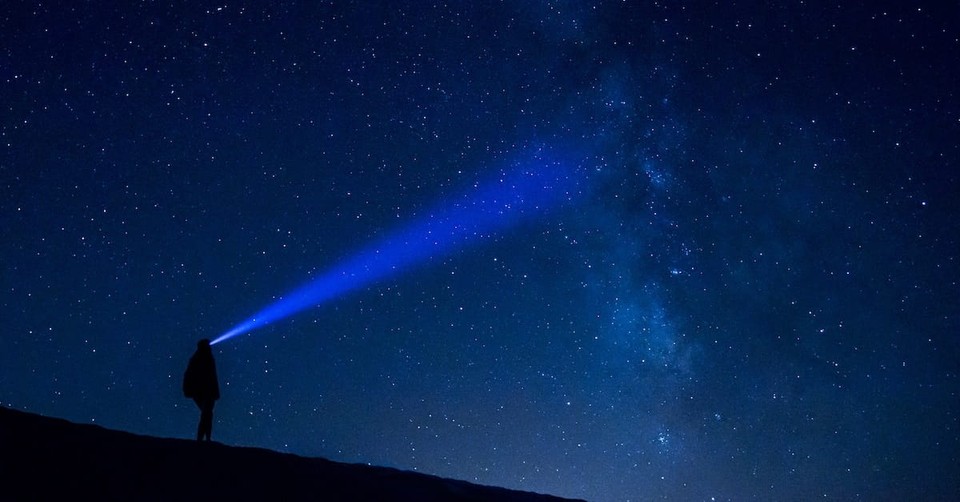Why We Hate Being Alone in the Dark

Recently, researchers at the University of California at Berkeley announced they would be part of a $100 million dollar project for space travel to see if there’s intelligent life in the universe. (Coincidentally, Stanford, which is Berkeley’s big rival in the Bay Area, where I live, recently announced a massive project to see if there’s intelligent life in Berkeley.) The plan is to send tiny nanocrafts—like spaceship butterflies—traveling at one-fifth the speed of light to Alpha Centauri. Stephen Hawking expressed the purpose poignantly: “It’s important to know if we’re alone in the dark.”1
The folks in Berkeley are not the only ones who want to know. It turns out that everyone—including you and me—is constantly sending out tiny little probes, emotional nanocrafts, to find out whether they’re alone in the dark. They travel at high speed, and it’s easy to miss them. Those who are skillful at recognizing and responding to these probes have a great gift for cultivating intimate friendships. Those who are blind, or nonresponsive to them, often end up alone in the dark.
These emotional nanocrafts are what relational expert John Gottman calls “bids” for emotional connection.2 We start issuing these bids before we can talk. A baby’s cry is a bid to connect. As we grow older, these bids—or invitations— for intimacy take other forms. “A bid can be a question, a gesture, a look, a touch—any single expression that says ‘I want to connect with you.’”3 Intimacy of every kind is either built up or eroded based on how well we handle the subtle little nanocrafts of relational life.
Jesus walked through life as a master of intimacy. His invitations to connection were quite fearless in the face of possible rejection:
He asked a Samaritan woman to give him something to drink. It began an intimate conversation that would change her life.
He noticed a vertically challenged tax collector named Zacchaeus sitting up in a tree and invited him to come down and join him for dinner.
He noticed the little children that everyone else shooed away. He invited them to come to him, took them in his arms, and blessed them.
Throughout his life, Jesus pursued intimate fellowship with everyone from fishermen, prostitutes, tax collectors, and soldiers, to Pharisees who came to him by night and lepers who came to him by day.
He gave the greatest invitation ever offered, in two simple words: “Follow me.” He extended the invitation to people walking alongside a lake, to a man in a toll booth, to a rich young ruler (who rejected it), and to people who had suffered loss.
Jesus was Peter’s intimate friend for three years. Then after Peter had denied Jesus and Jesus had forgiven him, in the very last chapter of the Gospel of John, Jesus issues his invitation to Peter one more time: “Follow me.”4
And now Jesus offers the same invitation to you. Just as he offered to be with those who would follow him back then, in the midst of their ordinary lives, so too, he offers to walk with you in the midst of your ordinary life today.
Will you accept, reject, or ignore him?
If you choose door #2 or #3, don’t think that’s the end of the story. God continually invites us to connect with him. And he doesn’t give up.
Each sunrise is no less miraculous just because we’ve gotten used to the seeing the sun rise. Waking up in the morning is a habit, but it’s also a mystery and it can be a gift. We might begin to see the start of the day as an invitation to enjoy the gift of life rather than as a burden to be endured with gritted teeth.
Jesus said that seeing a person in need can be an invitation: “Whatever you did for one of the least of these . . . you did for me.” But then we have to be willing to be interrupted and enter into suffering.
Our work might be an invitation: “Whatever you do, work heartily, as for the Lord and not for men.”5 Our computers might become little altars as we’re clicking away at the mouse of God.
Even loneliness can become an invitation to intimacy if we’re willing to sit quietly and listen rather than distract ourselves with a drink or a screen: “Deep calls to deep,”6
Light speaks to us of God’s goodness; darkness speaks of our need. But both can become offers of God’s presence: “By day the Lord directs his love, at night his song is with me.”7
The heavens declare God’s glorious presence, but so do humbler delights on earth—“such created excellencies as the velvety coat of a puppy or the honking of geese in a November fly-by or the hitchhiking home of young beetles on the backs of bees.”8
Stabs of guilt and pangs of regret become invitations to mercy and grace.
Perhaps Elizabeth Barret Browning was right after all:
Earth’s crammed with heaven,
And every common bush afire with God,
But only he who sees, takes off his shoes;
The rest sit round it, and pluck blackberries.”9
The point is, God sends us invitations to connect every day. And we can accept them, ignore them, or reject them. And we can learn to grow more skillful in recognizing these invitations to intimacy with God. Settle back in your chair. Be still. Grab a cup of coffee if it helps. Invite Jesus to experience your day with you. Take a moment to thank God for reaching out to you. Take a moment to confess and ask God’s pardon for those times when you’ve ignored or rejected his overtures. Take a moment and ask for God’s help in seeing and responding to his invitations. Then, hear Jesus issue the Grand Invitation to you once again.
“Follow me.”
In spite of your failures and betrayals, he calls you again, just as he did for Peter.
“Follow me.”
Tell him yes. Invite him to walk with you through every part of your day.
Welcome his presence in your life—if for no other reason than because it’s important to know that you’re not alone in the dark.
1. Charlie Cooper, “Stephen Hawking: There is ‘no bigger question’ in science than the search for extraterrestrial life,” Independent, 20 July 2015; www.independent.co.uk/news/science/stephen-hawking-there-is-no-bigger-question-in-science-than-the-search-for-extraterrestrial-life-10402432.html.
2. John M. Gottman and Joan DeClaire, The Relationship Cure (New York: Three Rivers Press, 2001), 4.
3. Ibid.
4. John 21:19
5. Colossians 3:23 esv
6. Psalm 42:7
7. Psalm 42:8
8. Cornelius Plantinga Jr., Not the Way It’s Supposed to Be: A Breviary of Sin (Grand Rapids: Eerdmans, 1995), 11.
9. Elizabeth Barrett Browning, “Aurora Leigh” (1856), in Aurora Leigh and Other Poems (New York: Penguin, 1995), 232.

John Ortberg is the senior pastor at Menlo Church, an author, and a speaker. John's teaching centers around our everyday life with God and how God cares more about who we are becoming than what we do. He has written books on spiritual formation including, The Life You've Always Wanted, Faith and Doubt, Who is This Man?, and Soul Keeping.
Born and raised in Rockford, Illinois, John graduated from Wheaton College with a degree in psychology. He holds a master of divinity and doctorate degree in clinical psychology from Fuller Seminary. Prior to joining Menlo Church, John served as teaching pastor at Chicago's Willow Creek Community Church. John is a member of the board of trustees at Fuller Seminary and the board for the Dallas Willard Center for Spiritual Formation, and he has served on the board of Christianity Today International. He can be followed on Twitter @johnortberg and on Facebook.
Image courtesy: ©Thinkstock/Aitormmfoto
Publicaiton date: October 3, 2017
Originally published October 03, 2017.







